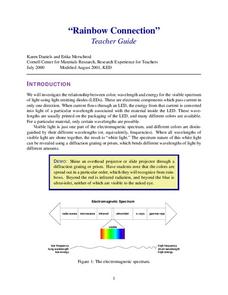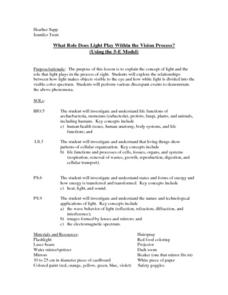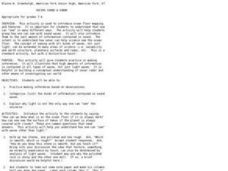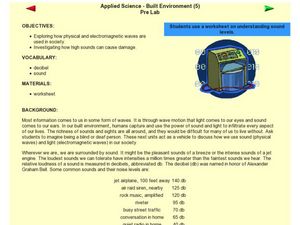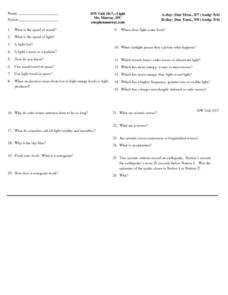Mr. E. Science
Sound
Since light travels faster than sound, some people may appear bright until you hear them speak. The presentation covers what sound is, how fast it travels in various mediums, properties of sound, hearing, and the parts of the human ear.
Curated OER
Observing Chemical Reactions
Start this series of lessons with a bang! Five exothermic reactions are outlined in this resource, including a demonstration that produces both light and sound. In the lab, chemistry apprentices record temperature changes, make hand...
BBC
Light and Shadows
Light is such an amazing thing! Elementary schoolers explore the wonderful world of light and shadow. The lesson is meant to be carried out on a whiteboard. Objects are placed in front of a light source, and learners must predict what...
BBC
Sound and Hearing
First and second graders recognize that sound is generated in a variety of ways, and that it comes from many different sources. They explore tone and volume, realizing that there are different ways to describe sound. Some musical...
Curated OER
Waves: Sound and Light
A few definitions related to waves open this slide show. Note that the information only covers light waves even though the title mentions sound. Correct the title before using this resource. Another mention is a set of photos of a class...
Curated OER
Tic Tac KNOW: Heat and Light
This is a very developed interactive tic-tac-toe game, with 29 separate game slides. To place a mark on the grid, learners must answer a question correctly. When the grid place is selected the energy, heat and light questions appear on...
Exploratorium
Bird in the Cage
When your life science class is learning about the eye and how it works, you can add this activity as a demonstration of how the retina holds an afterimage. After staring at a red, green, or blue bird shape, pupils glance at a cage and...
Cornell University
LEDs Rainbow Connection
View LED lights through the eyes of a scientist. Young scholars learn to view light as a wave frequency and connect various frequencies to different colors on the light spectrum. A lab activity asks groups to measure the frequency of...
PHET
Wave Interference
Why did the waves get into a fight? They were tired of each other's interference. Scholars observe the wave patterns from dripping water, sound waves, and light waves. They vary the spacing, build barriers, and increase the number of...
It's About Time
Inferences of Waves
Building on the previous lesson, scholars use Slinkies to create standing waves. They graph waves on a calculator and then apply their knowledge to both sound and light waves. This is the fourth in a series of nine lessons.
Curated OER
Physical Science: Magnetism and Electricity
Students use a variety of objects to test for ability to "stick" to a magnet. They perform an experiment to see that electricity in circuits can produce light, heat, sound, and magnetic effects. They discover magnets attract and repel...
Curated OER
Sound
Fifth graders explore and examine the basic properties of sound. In pairs, they speak through a balloon and listen to the sound vibrations, and listen to a ticking clock or watch through a variety of materials and identify the...
Curated OER
Move Heat Light Sound
In this identifying the energy used by objects instructional activity, students observe pictures of household items and write the words move, heat, light, or sound to tell their energy source. Students write 12 answers.
Curated OER
Light, Sound and Energy
The students will be given opportunities to work independently and in teacher-directed situations to study and discover the many facets of light and sound, and the uses of energy in our environment. The grade 4 students will learn the...
Curated OER
What Role Does Light Play Within the Vision Process?
Learners are introduced to the relationship between light and vision. In groups, they participate in experiments to discover how different wavelengths are divided in the visible spectrum. They record their answers and discuss their...
Curated OER
Speed of Sound
Students examine the phenomenon of sounds traveling slower than light. They discover why they see things before they hear them and how to estimate the speed of sound as homework.
Curated OER
Seeing Sound & Sonar
Students make inferences based on different sounds that they hear. For this inferences lesson plan, students will hear sounds of different objects and describe the sounds based on what they hear. They will answer various questions about...
Curated OER
Applied Science - Built Environment (5) Pre Lab
Fifth graders look at the impact of sound and noise. For this sound lesson, 5th graders review the decibel and common sounds along with their noise levels. They complete a worksheet about the different sounds that one might hear during...
Curated OER
HW Unit 10:7-Light
In this light worksheet, high schoolers answer twenty six questions about sound and light and how they both travel. They also answer questions about different types of waves in the electromagnetic spectrum such as radio waves, visible...
Curated OER
Strange Sounds
Students investigate sound as a form of energy. In this energy, forces, and sound lesson plan, students explore how different sounds may be made as they make a variety of materials vibrate. Students observe the effects of vibrations and...
Curated OER
Using Bubbles to Learn about Light Interference
Students explore constructive interference and destructive interference. In this light travel lesson, students follow procedures to discover how light waves travel and experience interference.
Curated OER
Light
In this light worksheet, students read what makes light, the speed of light, and the electromagnetic spectrum. Students complete 12 matching, 8 fill in the blank, and 9 word problems.
Curated OER
Light
In this light worksheet, students match 12 terms related to light and the electromagnetic spectrum to their definitions, they order waves by their speed, they analyze the energy and wavelengths of the electromagnetic spectrum and they...
Curated OER
Sound Waves Simulation Worksheet
In this sound wave worksheet, students go to http://phet.colorado.edu/new/simulations/sims.php?sim=Sound and run the simulation to complete 28 short answer question.









